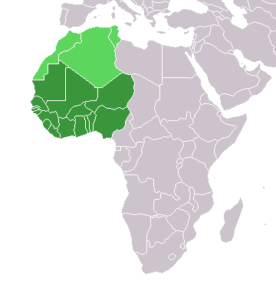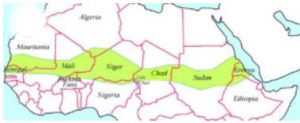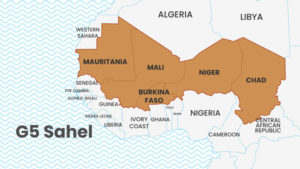Sahel: continued security deterioration.
 Mauritania has not been attacked by terrorists since 2011, and is hosting up to 115,136 Malian refugees and asylum seekers on its territory at the end of this past October. Chad is subject to sporadic attacks, such as the one that occurred on November 22, on the Bouka-Toulloroum Island, Lake Chad province, and attributed to the Boko Haram. However, Chad retains a certain control of its territory. So far, Niger has managed to prevent terrorists from occupying one ounce of its territory, partially with support from French air forces. Burkina Faso is losing its stability following regular attacks by terrorists and criminals who control over 40% of its territory. For its part, Mali continues to go down under the terrible pounding of the jihadists who occupy or threaten 80% of its soil. Alert!
Mauritania has not been attacked by terrorists since 2011, and is hosting up to 115,136 Malian refugees and asylum seekers on its territory at the end of this past October. Chad is subject to sporadic attacks, such as the one that occurred on November 22, on the Bouka-Toulloroum Island, Lake Chad province, and attributed to the Boko Haram. However, Chad retains a certain control of its territory. So far, Niger has managed to prevent terrorists from occupying one ounce of its territory, partially with support from French air forces. Burkina Faso is losing its stability following regular attacks by terrorists and criminals who control over 40% of its territory. For its part, Mali continues to go down under the terrible pounding of the jihadists who occupy or threaten 80% of its soil. Alert!

 Obvious, that very complex question is now more frequently raised than ever before. It calls for an answer. Ten years of wars – with international forces support – deaths, injuries, displacements and budgets in billions of dollars, have not reduced terrorists presence or expansion. Isn’t it then time to change – analysis, strategy and combat – to openly ask, experts and especially the victims, that is to say the populations?
Obvious, that very complex question is now more frequently raised than ever before. It calls for an answer. Ten years of wars – with international forces support – deaths, injuries, displacements and budgets in billions of dollars, have not reduced terrorists presence or expansion. Isn’t it then time to change – analysis, strategy and combat – to openly ask, experts and especially the victims, that is to say the populations? The Sahel countries are facing the following dilemma: how to fight terrorism without the cooperation of that scourge epicenter ei Mali? The Transition regime pushed the French force Barkhane and the European group of special forces, Takuba, to leave its territory. Instead, Bamako chose to resort to the Russian paramilitary company, Wagner. The ruling junta has withdrawn Mali from the G5 Sahel. Malian Armed Forces (FAMA) have deserted the outposts of the three borders (Burkina, Mali and Niger) strategic zone. Now, the country seems to be confined within its territorial limits and deaf to calls for cooperation from its embarrassed neighbors.
The Sahel countries are facing the following dilemma: how to fight terrorism without the cooperation of that scourge epicenter ei Mali? The Transition regime pushed the French force Barkhane and the European group of special forces, Takuba, to leave its territory. Instead, Bamako chose to resort to the Russian paramilitary company, Wagner. The ruling junta has withdrawn Mali from the G5 Sahel. Malian Armed Forces (FAMA) have deserted the outposts of the three borders (Burkina, Mali and Niger) strategic zone. Now, the country seems to be confined within its territorial limits and deaf to calls for cooperation from its embarrassed neighbors.